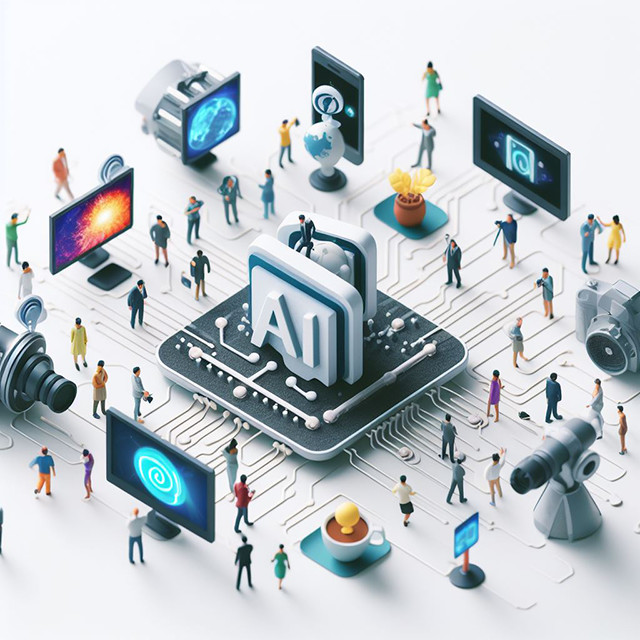Exploring Ethical AI Applications for Social Good
Exploring Ways AI Could Benefit Society if Ethically Implemented:
There is growing public discourse around artificial intelligence (AI) and its potential impacts on society. While concerns about risks are justified, there are also many promising ways these technologies could enhance human capabilities and living standards if developed prudently. This article aims to provide an overview of ethical applications of AI that could uplift the human condition across areas like: Healthcare - using AI for improved diagnosis, treatment and medical access Education - AI tutors and technologies making learning personalized and engaging Sustainability - optimizing processes to reduce waste, emissions and environmental harm Accessibility - intelligent assistants and interfaces to empower those with disabilities Creativity - arts and music augmented but not replaced by AI However, realizing this future requires foresight and cooperation among scientists, policymakers, corporations, and society. The following sections explore these areas further.
Healthcare:
AI is already demonstrating potential to improve healthcare outcomes and access. For example, algorithms can analyze radiological scans like mammograms with greater speed and accuracy than humans, aiding diagnosis of conditions like cancer. Startups like Qure.ai are developing such AI diagnostic assistants to identify abnormalities and save radiologists’ time. Machine learning models can also optimize cancer treatment plans based on data of what worked best for similar patients historically. Researchers at BC Cancer have created models that suggest individualized treatment regimens to boost survival chances. Chatbots like Sensely are being designed to provide basic medical guidance virtually, improving accessibility. However, ethical implementation of artificial intelligence is crucial in healthcare, as it involves highly sensitive patient data. AI systems designed for medicine should be rigorously validated to avoid potentially deadly errors or biases. Thoughtful user interface design can also increase trust by explaining an AI’s reasoning in an interpretable way to doctors. If healthcare providers are transparent about use of machine learning and deep learning models and address valid concerns about neural networks, these AI innovations could revolutionize medicine for the better.
Education:
AI tutors designed with personalization in mind could make high-quality, tailored education available to all students regardless of geography and resources. Companies like Century Tech are creating adaptive learning systems that track individual progress to focus on building struggling students’ competencies, while accelerating more advanced students. Other initiatives like Crammer AI act as virtual tutors that perpetually improve by incorporating feedback on what teaching strategies were most effective for different learning styles. Gamified education applications by startups like Kyt makes learning interactive and engaging. However, reducing harmful biases in training data and algorithms is critical so underprivileged students are not disadvantaged. Further, AI should not fully replace human teachers but rather complement them. If designed ethically leveraging innovations in deep learning and neural networks, AI has immense potential to democratize outstanding education worldwide.
Sustainability:
Applying AI to optimize energy grids, transportation networks, manufacturing/agricultural processes and resource chains could substantially reduce waste and environmental impact. However, economic disruption must be addressed through policy and retraining support for impacted industries. AI monitoring of deforestation and wildlife populations could enable rapid enforcement and intervention. Predictive analytics applied to climate data could guide preemptive action to mitigate natural disasters. Smart city systems can optimize traffic flows and energy usage, but urban planners should be judicious adopting autonomous technology and consider community input. Overall, AI may profoundly augment sustainability initiatives, if deployed thoughtfully. Here is an interesting article on the matter: Sustainability & AI: 10 AI Applications in Sustainability in 2023
Accessibility:
AI could open up new worlds for underserved populations, including seniors and people with disabilities, via applications like intelligent virtual assistants, self-driving vehicles, and software that adapts interfaces to user capabilities. However, these communities should be involved from the beginning in designing human-centered AI systems that earn user trust and empower them with independence. Startups should follow principles of inclusive design and address real needs identified through outreach. With user-centric development, AI could make essential services drastically more accessible.
Creativity:
While AI cannot replicate human imagination, certain creative applications show promise when designed carefully. For example, AI co-creators that are trained on an artist’s style could suggest novel directions to explore. Musical composition tools could help human musicians expand their repertoire. Open dialogue between developers and creators will be important to set appropriate expectations. The goal should be augmenting human creativity, not replacing it. If framed as a collaborative tool, AI has potential to enhance society’s creative output and diversity.
Emerging Innovations in Barcelona:
Barcelona is one of Europe's leading hubs for AI research and adoption. For example, the Barcelona Supercomputing Center pioneers new techniques in machine learning and applies AI to challenges like climate change modeling. Startups like Rob Surgical, a biotech company based in Barcelona, that develops best-in-class robots for minimally invasive surgery, uses artificial intelligence to improve surgery outcomes. In healthcare, Researchers of Barcelona's Hospital Clínic-IDIBAPS participate in EuCanImage, a project from the Horizon 2020 program that will build a federated and scalable cancer imaging platform, to contribute to the improvement of the potential of artificial intelligence and precision medicine in oncology. Barcelona's Institute of Photonic Sciences harnesses machine learning for quantum computing breakthroughs. In transportation, self-driving vehicle company Autonomous Mobility seeks to reshape urban mobility. Barcelona's startup ecosystem supports many young firms applying AI to transform industries and society. The city's strong engineering and computer science programs also cultivate local AI talent. If Barcelona continues to responsibly nurture its position as a hub for artificial intelligence innovations, it could gain immensely from wisely leveraging these technologies to uplift quality of life.
Conclusion:
Realizing a future where AI broadly uplifts humanity will require proactive cooperation across society. Scientists have a duty to adhere to ethical principles and assess risks rigorously before deployment. Policymakers need to develop nuanced governance that encourages innovation while establishing oversight. Corporations must ensure business interests align with humanistic values. Engaging communities impacted by AI will be critical, especially underserved populations. With care, wisdom and transparency, perhaps AI can be guided towards applications that profoundly benefit humanity. But achieving this will take dedicated effort and open communication between all involved.



Comments
Post a Comment